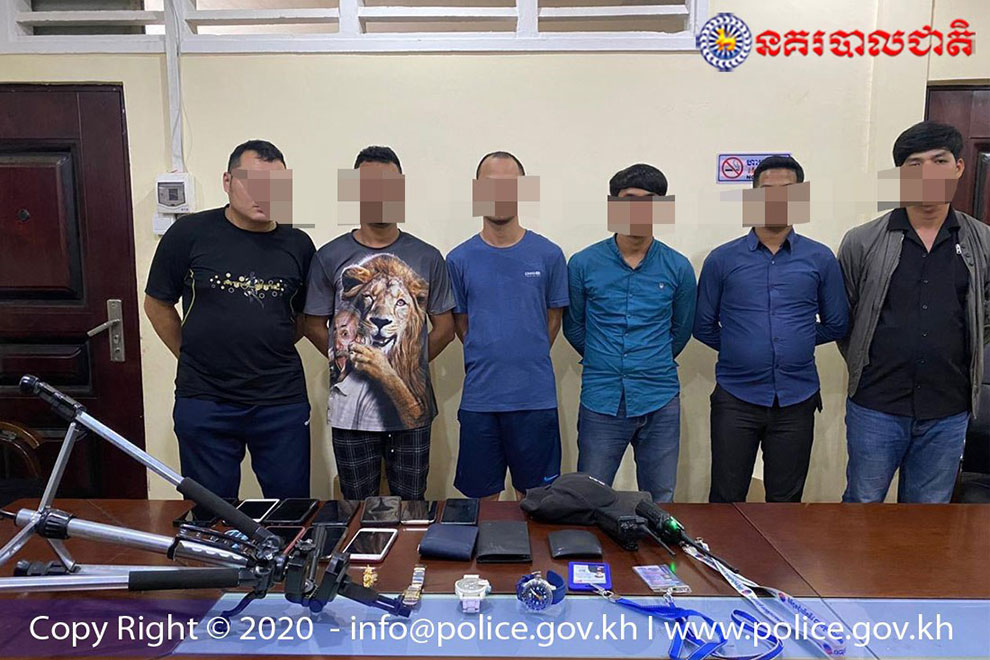Preah Sihanouk provincial police on September 8 arrested six people, including four journalists, for allegedly threatening and extorting money from a Chinese national.
Provincial Police Chief Chuon Narin said September 10 that police arrested the six for extortion and incitement to commit an offense after they received a complaint from the Chinese national, Zhang Kang, on September 6.
“We did not arrest them as journalists, but they were arrested for committing the red-handed crimes of incitement and threatening to extort money,” he said, adding that police only discovered that four of the suspects were journalists working for online news agencies after questioning them.
Narin said that the six suspects had told Kang, who works as a taxi driver, that they were policemen and had demanded $4,000 from the victim, who gave them $2,300 because he was afraid he would be arrested if he did not comply.
“They then threatened the victim that if he didn’t pay [the rest of the money] they would arrest him and place him in prison,” he said.
Police named the suspects as Hak Sophanha, 30, a journalist at The Cambodia News Place, Oun Bros, 27, and his assistant Sim Sokda, 30, who work for Cam Post, Chin Bunthoeun, 27, a journalist at News Online, and Chinese nationals Zhou Dongya, 30, and Chamoeun Leangmeng, 27.
Narin said that the six had been sent to the court for questioning following procedure.
Provincial court deputy prosecutor and spokesman Lim Bunheng said the suspects were currently being held at the provincial police station, and would be questioned further by the court on September 12.
Sreng Dara, the CEO of online news website Cam Post, saidSeptember 11 called on police to conduct a thorough investigation into the arrest of Bros, and emphasized that the reports of extortion that police have described are unrelated to the suspects’ careers as journalists.
Dara claimed that Bros did not intend to commit a crime,and that he had “fallen into a trap.” He said he had personally received information that the Chinese victim and two suspects of the same nationality knew each other, and had concocted the scam involving journalists so that they wouldreport the story in exchange for money.
“He [Kang] told him that if he disseminates the information, [he] will receive some money and free foods such as noodles and coffee,” Dara said.
He said that he did not support any journalists, including his own staff, who tarnish the journalistic profession by committing crimes.
“For me as a journalist, I do not support those who violate the law,” he continued. “But we have asked police officials to thoroughly investigate to avoid injustice against journalists who did not commit any wrongdoing.”
The Cambodia News Place publisher Rey Norea, said Sophanha and Bunthoeun had been fired on August 12 from the media institution after they broke an internal rule.
He said that upon leaving, Bunthoeun had handed in his press card, but Sophanha did not. Shortly after, Bunthouen was recruited to work at News Online.
“What they have done, it does not involve my media organization because they were both fired,” he said. “I always instructed them to adhere to the ethics of journalism.”
Pen Bona, president of the Club of Cambodian Journalists (CCJ), said the press club is conducting its own investigation into the incident.
“My working groups are investigating because we need to know the root of the case,” he said, adding that CCJ would always seek to protect journalists who had been apprehended while on the job.
“Sometimes, we need to clarify information in order to talk honestly with authorities about whether the journalists’ or the other party had made a mistake,” Bona said.
Nop Vy, executive director of the Cambodian Journalists Alliance (CamboJA), said journalists should not be charged under the Criminal Code in cases where they had taken money in exchange for not publishing a story.
“I think that in this case, authorities should conduct a careful investigation before making any accusations because our journalists aim to report information to serve the interests of the public,” he said, adding that CamboJA does not support any individuals who have violated the ethics of journalism.
“We support officials’ efforts to implement the law if there is an individual issue that constitutes a crime,” Vy said. “We are studying [the situation] and will go down to investigate the case as well.”
He added that some online media journalists may lack professional journalism training and may not have a detailed understanding of the law.








